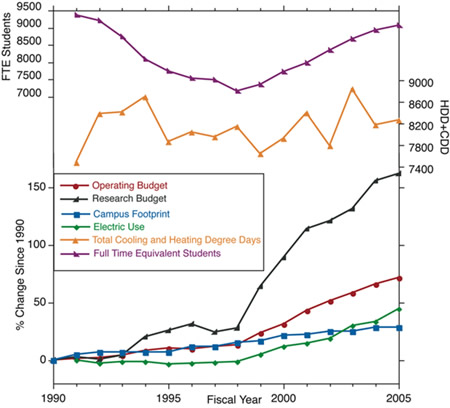The Climate Change Institute's Climate Policy Group (CPG) is a graduate student led effort committed to improving sustainability efforts throughout the University of Maine campus. To illustrate the need for change, we conducted the first campus-wide energy audit spanning 1990-2006, utilizing software from Clean Air- Cool Planet. Our data, collected in cooperation with facilities staff and administrators, reflects the University's need (both financially and environmentally) to curb energy use.
Campus electricity-use was ~ 40%greater in 2005 than between 1990-1999. The increase in energy consumption is not driven by changes in the university's population, local climate or campus footprint. Student behaviours (e.g. increased use of personal electronics) and the addition of new energy-intensive research buildings contribute to increased energy use. Our results also show that emissions have increased from s ~ 50,000 kg CO2 in 1991 to ~ 70,000 kg CO2 in 2005.

We are working closely with University administration and facilities staff on a range of studies and solutions. Our achievements to date include:
- Completion of a detailed greenhouse gas inventory for the campus from 1990 - 2006;
- Signing a partnership with Clean Air - Cool Planet to inventory and reduce the University's carbon footprint;
- Signing on to the Governor's Carbon Challenge;
- Organizing a network of interest groups (faculty, undergraduate students, graduate students, staff and administrators) who are eager to reduce the University of Maine's environmental impact (and energy bill).
Several additional initiatives are underway, including:
- Encouraging the University to hire a full-time energy manager - a national search is now underway and we expect the position to be filled in the fall 2006 semester;
- Presenting the environmental and economic cases for hiring a full-time campus sustainability officer, including researching possible start-up support from foundations for this position;
- Encouraging the University to research alternative and renewable sources of energy, and to purchase green, sustainable products;
- Helping establish a "Green loan fund" for campus-wide energy efficiency pilot projects;
- Implementing a campus-wide anti-idle policy;
- Changing the settings on all university computers to operate in energy efficient mode.
